
FOLIA MICROBIOLOGICA
Scope & Guideline
Innovating Insights in Microbial Research.
Introduction
Aims and Scopes
- Microbial Diversity and Ecology:
Research focusing on the diversity, ecological roles, and interactions of microorganisms in various environments, including soil, water, and within host organisms. - Biotechnology and Applied Microbiology:
Studies that explore the biotechnological applications of microorganisms, such as the production of enzymes, biofuels, and pharmaceuticals, as well as their roles in bioremediation and sustainable agriculture. - Pathogen Biology and Antimicrobial Resistance:
Investigations into pathogenic microorganisms, their mechanisms of virulence, and the emergence of antimicrobial resistance, contributing to the understanding of infectious diseases. - Microbial Metabolism and Biochemical Pathways:
Research on the metabolic pathways of microorganisms, including biotransformation processes and the enzymatic activities that contribute to their survival and applications. - Probiotics and Gut Microbiota:
Exploration of the role of probiotics and gut microbiota in health and disease, including their potential therapeutic applications and impacts on human health. - Innovative Detection and Characterization Techniques:
Development and application of novel methodologies for the detection, characterization, and analysis of microorganisms, including molecular techniques and bioinformatics.
Trending and Emerging
- Microbiome Research:
There is a growing emphasis on the role of microbiomes in health, agriculture, and ecosystems, highlighting their complex interactions and potential therapeutic applications. - Bioremediation and Environmental Sustainability:
Research focusing on the use of microorganisms for bioremediation is on the rise, reflecting increased awareness of environmental issues and the need for sustainable solutions. - Antimicrobial Resistance Mechanisms:
Studies investigating the mechanisms of antimicrobial resistance are increasingly prevalent, driven by the global health crisis of resistant pathogens and the need for new strategies. - Microbial Nanotechnology:
Emerging studies on the use of nanotechnology in microbial applications are gaining traction, particularly in areas such as drug delivery, biosensing, and environmental remediation. - Plant-Microbe Interactions:
Research exploring the interactions between plants and microbes, particularly in the context of agricultural sustainability and plant health, is becoming a prominent theme.
Declining or Waning
- Traditional Antibiotic Development:
Research focused on the development of new antibiotics has seen a decline, as the field increasingly shifts towards understanding resistance mechanisms and alternative therapeutic strategies. - Basic Microbial Physiology:
Studies centered on fundamental microbial physiology are becoming less frequent, with more emphasis placed on applied research and ecological interactions. - Conventional Fermentation Processes:
Investigations into traditional fermentation processes are waning as more innovative biotechnological methods, such as genetic engineering and synthetic biology, gain traction. - Environmental Microbiology without Bioremediation Focus:
While environmental microbiology remains relevant, studies not tied to bioremediation or practical applications are becoming less common, reflecting a trend towards applied research.
Similar Journals
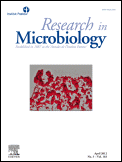
RESEARCH IN MICROBIOLOGY
Advancing the frontiers of microbiological research.Research in Microbiology, published by Elsevier, is a prominent academic journal devoted to advancing the field of microbiology, encompassing a diverse array of topics including immunology, molecular biology, and biochemistry. Established in 1987, the journal has expanded its focus over the years, with a commendable impact factor reflecting its relevance and influence in the scientific community. Although it does not currently offer open access options, Research in Microbiology remains a crucial resource for researchers and professionals seeking to stay abreast of the latest findings and methodologies. The journal holds a respectable Q2 ranking in Medicine (miscellaneous) and a Q3 ranking in both Microbiology and Molecular Biology for 2023, highlighting its position within the scholarly landscape. With its base in France and accessible to a global audience, Research in Microbiology continues to foster scholarly exchange, making it an essential platform for the dissemination of impactful microbiological research.

ANTONIE VAN LEEUWENHOEK INTERNATIONAL JOURNAL OF GENERAL AND MOLECULAR MICROBIOLOGY
Illuminating the Path of Microbial InnovationANTONIE VAN LEEUWENHOEK INTERNATIONAL JOURNAL OF GENERAL AND MOLECULAR MICROBIOLOGY, published by Springer, is a vital resource for advancing research in the fields of microbiology and molecular biology. With its ISSN 0003-6072 and E-ISSN 1572-9699, this journal consistently focuses on cutting-edge studies and developments, providing a platform for the dissemination of knowledge that spans over its rich history from 1934 onwards. The journal holds an impressive reputation, ranked Q2 in Medicine (miscellaneous) and Q3 in both Microbiology and Molecular Biology for 2023, reflecting its significant contribution to the scientific community. Researchers and professionals from various disciplines rely on this journal for quality publications that address complex microbial interactions and molecular mechanisms. Although it currently does not provide open access options, its compelling research remains accessible through institutional subscriptions, allowing it to foster collaborative advancements in the ever-evolving landscape of microbiological sciences.
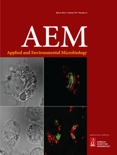
APPLIED AND ENVIRONMENTAL MICROBIOLOGY
Exploring Microbial Innovations for a Sustainable FutureApplied and Environmental Microbiology, published by the American Society for Microbiology, stands as a leading journal in the fields of applied microbiology and environmental science since its inception in 1976. With a prestigious Q1 quartile ranking across multiple categories including Applied Microbiology and Biotechnology, Ecology, and Food Science, this journal consistently disseminates high-impact research that drives innovation and advances our understanding of microbial interactions within our ecosystems and industries. As ranked by Scopus, it exhibits prominent rankings in various related fields, underscoring its critical role in shaping contemporary microbiological research. Researchers, professionals, and students alike can stay abreast of groundbreaking studies while contributing to a vast body of knowledge that spans diverse aspects of microbiology, biotechnology, and ecology, ultimately contributing to sustainable practices. Join the community of dedicated scholars and explore vital research findings that impact both environmental health and technological advancement.
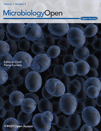
MicrobiologyOpen
Unlocking the frontiers of microbiology through open access.MicrobiologyOpen is a prestigious, open access journal published by WILEY, dedicated to advancing the field of microbiology. Since its inception in 2012, this journal has firmly established itself as a significant platform for researchers, professionals, and students alike, facilitating the dissemination of high-quality research findings across a wide range of microbiological disciplines. With an impressive impact factor and a ranking in the 76th percentile of Scopus for immunology and microbiology, MicrobiologyOpen offers a robust forum for innovative studies, reviews, and compelling insights that push the boundaries of scientific understanding. The journal's commitment to open access ensures that groundbreaking research is freely available to the global community, fostering collaboration and knowledge-sharing. As it continues to evolve until 2024, MicrobiologyOpen remains pivotal for anyone looking to stay at the forefront of microbiological research.
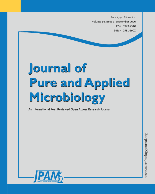
Journal of Pure and Applied Microbiology
Transforming Microbial Discoveries into Real-World ApplicationsJournal of Pure and Applied Microbiology, published by DR M N KHAN, is an esteemed Open Access journal that has been dedicated to advancing the frontiers of microbiological research since its inception in 2007. Located in Bhopal, Madhya Pradesh, India, this journal presents a platform for researchers and professionals in the fields of Applied Microbiology and Biotechnology, offering insights that span a diverse range of topics critical to both scientific progress and industrial applications. As of 2023, the journal is categorized in the Q3 and Q4 quartiles, demonstrating its relevance and growing impact within the community—ranking #219 in Biochemistry, Genetics and Molecular Biology and #93 in Immunology and Microbiology. With an emphasis on accessibility, the journal has embraced an Open Access format since 2017, allowing for a wider dissemination of knowledge. By publishing high-quality research, the Journal of Pure and Applied Microbiology plays a pivotal role in fostering innovation and collaboration among researchers, students, and industry professionals alike.
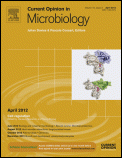
CURRENT OPINION IN MICROBIOLOGY
Connecting researchers with cutting-edge microbiological knowledge.CURRENT OPINION IN MICROBIOLOGY is a prestigious academic journal published by CURRENT BIOLOGY LTD, dedicated to advancing the field of microbiology through timely and insightful reviews. With an ISSN of 1369-5274 and an e-ISSN of 1879-0364, this journal has established itself as a leading source of knowledge in various subfields, consistently achieving a Q1 ranking in Infectious Diseases and Microbiology for 2023. Operating from the United Kingdom, CURRENT OPINION IN MICROBIOLOGY serves a critical role for researchers, clinicians, and students alike by disseminating groundbreaking findings and fostering discussions that shape the future of microbiological research. The journal's rigorous selection process ensures that only high-quality articles are published, reflecting its strong impact factor and high percentile rankings across relevant Scopus categories. Although it does not follow an open-access model, its comprehensive scope and valuable contributions to the medical and scientific community underscore its importance as an essential resource for advancing our understanding of microbial sciences.

Malaysian Journal of Microbiology
Empowering Scientists: Your Gateway to Microbiology DiscoveriesMalaysian Journal of Microbiology is a prestigious open-access journal dedicated to advancing the field of microbiology, published by the Malaysian Society for Microbiology. Since its inception in 2005, this journal has become an essential platform for researchers and practitioners, facilitating the dissemination of innovative studies in applied microbiology, biotechnology, and infectious diseases. Based in Penang, Malaysia, this journal not only focuses on local microbiological research but also positions itself within the broader global scientific community. Although currently placed in the Q4 category in several relevant fields—including Applied Microbiology and Biotechnology, Infectious Diseases, and Medical Microbiology according to the 2023 Scopus rankings—it plays a crucial role in encouraging novel research and fostering collaboration among scientists. The journal encourages submissions that contribute to the understanding of microbial processes, disease mechanisms, and novel biotechnological applications, thereby supporting the continuous growth of knowledge in microbiology. With open access since its launch, the Malaysian Journal of Microbiology ensures that all published works are freely available to the public, enhancing their visibility and impact within the scientific community.

INDIAN JOURNAL OF MICROBIOLOGY
Empowering Discoveries in Microbial ScienceINDIAN JOURNAL OF MICROBIOLOGY, published by Springer, serves as a vital platform for the dissemination of cutting-edge research in the field of microbiology. With an ISSN of 0046-8991 and an E-ISSN of 0973-7715, this esteemed journal invites contributions that span various disciplines within microbiology, encompassing both fundamental studies and applied research that can impact health, environment, and industry. Recognized in the Q3 category in Microbiology for 2023, and ranking #80 out of 182 in Scopus’ Microbiology category, it reflects its commitment to quality and significance in the academic community. Authors and researchers benefit from the journal's comprehensive review process, which enhances the visibility and reach of their work. While no open access options are currently offered, the INDIAN JOURNAL OF MICROBIOLOGY remains a premier choice for those aiming to contribute to the ongoing dialogue in microbiological studies, ensuring that knowledge continues to evolve and thrive.

JOURNAL OF MICROBIOLOGY
Empowering researchers to shape the future of microbiology.JOURNAL OF MICROBIOLOGY, published by the Microbiological Society Korea, is a prestigious peer-reviewed journal dedicated to the advancement of knowledge in the fields of microbiology, applied microbiology, and biotechnology. Established in 1996, this journal serves as a vital platform for researchers and professionals from around the globe to disseminate their findings and engage in multidisciplinary discussions pertaining to microbial sciences. With an H-index that reflects its impact, the journal holds a commendable Q2 ranking in key categories including Applied Microbiology and Biotechnology, as well as Medicine (Miscellaneous), which underscores its significance in the academic community. Despite being a subscription-based journal, the JOURNAL OF MICROBIOLOGY aims to contribute to the understanding of microbial processes and their applications, facilitating advancements that are essential in health, industry, and environmental sciences. Researchers, students, and practitioners are encouraged to explore this rich resource for the latest research and trends in microbiology.
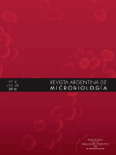
REVISTA ARGENTINA DE MICROBIOLOGIA
Advancing microbiological knowledge for a healthier tomorrow.REVISTA ARGENTINA DE MICROBIOLOGIA, published by the ASOCIACION ARGENTINA MICROBIOLOGIA, stands as a prominent open-access journal in the field of microbiology and medicine since its establishment in 1979. With an ISSN of 0325-7541 and an E-ISSN of 1851-7617, this journal has paved the way for disseminating high-quality research while enhancing accessibility for academics and practitioners worldwide. The journal has achieved notable rankings, being classified in Q3 for Medicine (miscellaneous) and Q3 for Medical Microbiology in 2023, reflecting its commitment to advancing knowledge in these critical areas. Despite its relatively modest impact factors, it occupies a vital niche in the academic landscape, fostering collaborations and innovative research among experts. With Open Access available since 2013, REVISTA ARGENTINA DE MICROBIOLOGIA not only facilitates widespread distribution of valuable scientific information but also empowers researchers, professionals, and students to stay abreast of the latest findings and developments in microbiology. For those engaged in the evolving realm of microbiology, this journal serves as an essential resource for sharing insights and advancing the scientific community.